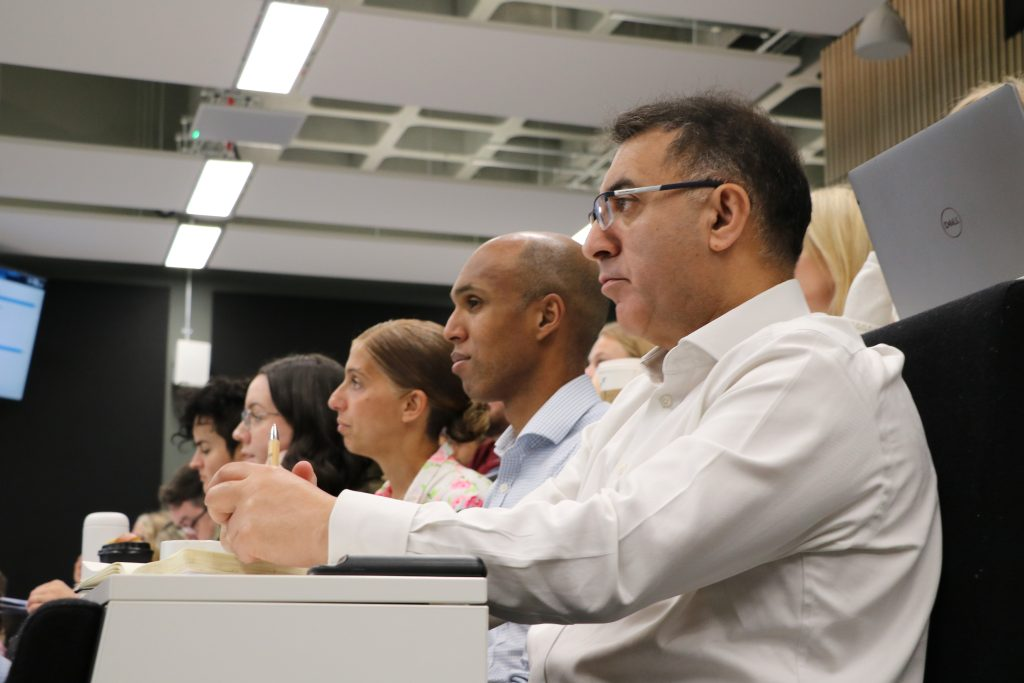Artificial intelligence (AI) is no longer a futuristic concept; it is a transformative force reshaping industries across the globe. London, a leading tech hub, is at the forefront of this revolution, with its vibrant ecosystem of startups, established companies, and academic institutions driving AI innovation. This article explores how various industries in London are adapting to and leveraging AI, highlighting the city’s pivotal role in this global technological shift.
Financial Services
AI in Fintech
London is renowned as a global financial centre, and its fintech sector is one of the most advanced in the world. AI is critical in this industry, enhancing everything from customer service to fraud detection.
- Fraud Detection and Prevention: Companies like Darktrace use AI to develop advanced cybersecurity solutions that identify and mitigate fraudulent activities in real-time. These systems use machine learning algorithms to detect unusual patterns and anomalies, providing a robust defence against increasingly sophisticated cyber threats.
- Personalised Banking: Startups such as Cleo are revolutionising personal finance by using AI to provide users with personalised financial advice and management tools. By analysing spending habits and financial behaviour, AI can offer tailored recommendations, helping individuals manage their finances more effectively.
- Algorithmic Trading: AI-driven algorithmic trading platforms, like those developed by fintech firms such as AlphaSense, are transforming investment strategies. These platforms use AI to analyse vast amounts of data and execute trades optimally, maximising returns and minimising risks.
iGaming Industry
AI in iGaming
The iGaming industry in London is experiencing a significant transformation due to the integration of AI on sites like Minimum deposit casinos enhancing user experiences, game development, and regulatory compliance.
- Personalised Gaming Experiences: AI algorithms analyse player behaviour and preferences to deliver personalised gaming experiences. This includes customised game recommendations, tailored bonuses, and personalised marketing efforts, ensuring players remain engaged and satisfied.
- Game Development and Testing: AI is revolutionising game development by automating design and testing aspects. Machine learning models can predict and identify potential bugs and issues, significantly speeding up the development process and improving game quality.
- Responsible Gambling and Fraud Detection: AI is crucial in promoting responsible gambling and detecting fraudulent activities. AI systems monitor player behaviour in real-time to identify signs of problem gambling and intervene accordingly. AI-driven fraud detection tools also help iGaming companies prevent cheating and financial fraud, ensuring a safe and fair gaming environment.
- Customer Support: AI-powered chatbots and virtual assistants enhance customer support in the iGaming sector. These AI systems provide instant responses to player inquiries, handle routine issues, and escalate complex problems to human agents, improving overall customer service.
Healthcare
AI in Medtech
London’s healthcare sector is experiencing a significant transformation due to the integration of AI technologies, improving patient care and operational efficiency.
- Diagnostic Tools: AI is enhancing diagnostic accuracy through image recognition and analysis. For instance, DeepMind Health, part of Alphabet Inc., is developing AI systems capable of analysing medical images to detect conditions such as diabetic retinopathy and age-related macular degeneration with high accuracy.
- Personalised Medicine: Companies like BenevolentAI use AI to analyse biomedical data and identify potential drug candidates, accelerating drug discovery. By tailoring treatments to individual genetic profiles, AI is paving the way for personalised medicine, improving treatment outcomes.
- Healthcare Administration: AI is also streamlining administrative tasks in healthcare. Startups like Babylon Health use AI-powered chatbots to handle patient inquiries and schedule appointments, reducing the burden on healthcare staff and improving efficiency.
Retail and E-commerce
AI in Retail
The retail industry in London is leveraging AI to enhance customer experiences, optimise operations, and increase sales.
- Customer Insights and Personalisation: Retailers like ASOS use AI to analyse customer data and predict buying behaviour. This enables highly personalised shopping experiences, from product recommendations to targeted marketing campaigns.
- Supply Chain Optimisation: AI is revolutionising supply chain management by predicting demand and optimising inventory levels. Ocado, an online grocery retailer, uses AI to automate its warehouses and improve logistics, ensuring efficient and timely deliveries.
- Virtual Assistants and Chatbots: AI-powered chatbots are becoming increasingly common in retail. They provide 24/7 customer support and assist with queries and purchases. These virtual assistants enhance customer satisfaction by offering instant and accurate responses.
- Returns Abuse and Chargeback Management Prevention: Sophisticated platforms offer real-time account monitoring that can be integrated with fraud prevention tools that provide advanced chargeback management solutions. Standard and customized workflows streamline operations and cost controls.
Transportation and Mobility
AI in Mobility
London’s transportation sector is undergoing a significant transformation. The integration of AI is improving urban mobility and reducing congestion.
- Autonomous Vehicles: Companies like FiveAI are at the forefront of developing autonomous vehicle technology. These AI-driven vehicles are designed to navigate complex urban environments, promising safer and more efficient transportation solutions.
- Smart Traffic Management: AI is being used to optimise traffic flow and reduce congestion in London. Transport for London (TfL) is implementing AI-driven traffic management systems that analyse real-time data to adjust traffic signals and improve traffic flow across the city.
- Predictive Maintenance: AI is also enhancing the maintenance of transportation infrastructure. AI can predict when maintenance is needed by analysing data from sensors on buses, trains, and tracks, preventing breakdowns and improving reliability.
Legal Services
AI in LegalTech
The legal industry in London is embracing AI to enhance efficiency and reduce costs, particularly in areas like document review and legal research.
- Document Analysis: AI-powered platforms like Luminance use machine learning to analyse legal documents quickly and accurately. This reduces the time and cost of manual document review, allowing lawyers to focus on more complex tasks.
- Predictive Analytics: AI predicts legal outcomes based on historical data. Companies like Premonition use AI to analyse court records and provide insights into case outcomes, helping legal professionals make informed decisions.
- Chatbots and Virtual Assistants: Law firms are implementing AI-powered chatbots to handle routine client inquiries and provide legal information. This improves client service and allows lawyers to concentrate on more strategic work.
Education
AI in Edtech
The education sector in London is leveraging AI to enhance learning experiences and improve educational outcomes.
- Personalised Learning: AI-driven platforms like Century Tech use machine learning to provide personalised learning pathways for students. These platforms adapt to individual learning styles and paces, ensuring each student receives a tailored educational experience.
- Administrative Efficiency: AI is streamlining administrative tasks in educational institutions. For example, chatbots can handle student inquiries, enrollment processes, and scheduling, freeing up staff to focus on teaching and support.
- Learning Analytics: AI analyses student performance data to identify areas where students need additional support. This enables educators to intervene early and provide targeted assistance, improving student outcomes.
Creative Industries
AI in CreativeTech
London’s creative industries, including advertising, media, and entertainment, harness AI to innovate and enhance creative processes.
- Content Creation: AI generates content, from writing articles to creating music and art. For instance, companies like Jukedeck use AI to compose music, allowing creators to produce custom soundtracks quickly and affordably.
- Advertising and Marketing: AI is revolutionising digital advertising by enabling hyper-targeted campaigns. Platforms like Adthena use AI to analyse market trends and competitor strategies, helping brands optimise their advertising efforts.
- Film and Media: AI is used in the film industry for script analysis and casting tasks. Companies like Cinelytic provide AI-driven insights to predict a film’s success and optimise production decisions.
London’s tech scene is rapidly adapting to the AI revolution, with significant advancements across various industries. From fintech and healthcare to retail, transportation, and iGaming, AI transforms how businesses operate and interact with customers. The city’s vibrant ecosystem of startups, established companies, and academic institutions drives this innovation, solidifying London’s position as a global leader in AI technology.
As AI continues to evolve, its impact on London’s industries will only grow, creating new opportunities and challenges. By embracing AI, London is not only enhancing its economic competitiveness but also shaping the future of technology on a global scale. The AI revolution is here, and London is at its epicentre, leading the charge into a new era of technological innovation.
FAQs
1. What is AI?
Artificial Intelligence (AI) is the simulation of human intelligence in machines programmed to think and learn like humans. It encompasses machine learning, natural language processing, robotics, and more.
2. How is AI impacting financial services in London?
AI enhances fraud detection, personalises banking services, and transforms algorithmic trading. Companies like Darktrace and Cleo are at the forefront of these innovations, improving efficiency and customer experience in the financial sector.
3. What role does AI play in healthcare?
AI is improving diagnostic accuracy, personalising medicine, and streamlining healthcare administration. Companies such as DeepMind Health and Babylon Health are pioneering these advancements, which will lead to better patient outcomes and more efficient healthcare systems.
4. How is AI transforming the retail industry?
AI is used for customer insights, supply chain optimisation, and retail virtual assistants. Retailers like ASOS and Ocado leverage AI to enhance customer experiences and operational efficiency.
5. What advancements are being made in transportation with AI?
AI drives innovations in autonomous vehicles, intelligent traffic management, and predictive maintenance. Companies like FiveAI and initiatives by Transport for London (TfL) are leading these changes to improve urban mobility.
6. How is AI used in the legal industry?
AI is utilised for document analysis, predictive analytics, and virtual assistants in legal services. Platforms like Luminance and Premonition are helping law firms enhance efficiency and reduce costs.
7. What benefits does AI bring to education?
AI provides personalised learning, streamlines administrative tasks, and enhances learning analytics. Companies like Century Tech are making significant strides in using AI to improve educational outcomes.
8. How are creative industries leveraging AI?
AI is used in content creation, advertising, and the film industry. Companies like Jukedeck and Cinelytic use AI to innovate and enhance creative processes.
9. What impact does AI have on the iGaming industry?
AI enhances personalised gaming experiences, streamlines game development and testing, promotes responsible gambling and improves customer support in the iGaming sector. AI-driven solutions help iGaming companies deliver safer and more engaging gaming experiences.
10. What is the future of AI in London’s tech scene?
The future of AI in London’s tech scene looks promising, with continuous advancements expected across various industries. As AI technology evolves, its integration into different sectors will likely create new opportunities and challenges, solidifying London’s position as a global leader in AI innovation.





